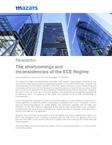
The shortcomings and inconsistencies of the ECE Regime
The regime for foreign controlled entities (hereinafter "ECE regime") was created in Colombia by Law 1819 of 2016 following the guidelines established by Action 3 of the OECD BEPS plan. However, this notwithstanding, the Colombian regulation of the ECE regime contains so many shortcomings and inconsistencies that even with the issuance of a regulatory decree (of which there is not even a draft yet) it could not be adjusted to the basic guidelines established by the OECD, being then necessary the reform of this via a new law or via the modulation of its effects through a judgment issued by the Constitutional Court. The purpose of this article is to highlight some of these shortcomings or inconsistencies.
In the first place, the philosophical reason for the ECE regime, as an anti-difference mechanism, is that its application is limited to entities incorporated in jurisdictions with low or no taxation or where there are preferential regimes for certain entities. The Colombian regulation did not make such distinction, so the ECE regime is applicable to any type of entity incorporated in any jurisdiction, including those that have a more burdensome tax regime than that of Colombia, which generates a serious inconsistency in its application.
Secondly, the rule brings a presumption of law that departs from what is established in Action 3 of BEPS and introduces a rule of dubious constitutionality (art. 885 of the Tax Statute), which is to presume that if 80% of the income of the ECE is passive, then the remaining 20% of the same will also be passive.
This presumption should be a legal presumption and not a legal presumption, i.e., it should admit proof to the contrary.
Thirdly, the Colombian regulation establishes (art. 884 b.) that the dividends received by the ECE will not be taxed in Colombia when they would not be taxed in Colombia (in the absence of such ECE) due to the existence of a Double Taxation Avoidance Agreement (hereinafter "DTAA"). This rule is inconsistent with the current regulation because the DTAs signed by Colombia (following the guidelines established in the OECD model agreement) only allow taxing dividends in the country of residence. Thus, such assumption would only occur in the case of dividend payments between countries of the Andean Community of Nations ("CAN"), where more than a DTA, there is a supranational regulation (Decision 578) that orders that dividends are only taxed in the country of the source.
Fourth, Article 886 of the Tax Statute states that the passive income obtained by an ECE "is understood to be realized in the head of Colombian tax residents who are income tax payers (...) in accordance with Articles 27, 886 and 887 of the Tax Statute (...). ) in accordance with Articles 27, 28 and 29 of this Statute", and given that said Article 27 establishes the rules for the realization of income for those who are not obliged to keep accounting records, and within these are excepted from the general rule - cashbox- income from dividends and sale of real estate (which shall be understood to be realized at the time of payment or credit on account and the date of the corresponding deed, respectively), then it is necessary to understand that the income obtained by an ECE "shall be understood to be realized at the time of payment or credit on account and the date of the corresponding deed, then it must be understood that when the ECE is controlled by a Colombian taxpayer not obliged to keep accounting records, the income from dividends received by it, or income received by it from the sale of real estate, will only be taxed in the head of the controlling entity once they are paid or credited on account (by the ECE to the taxpayer) or the corresponding public deed has been subscribed, respectively.
Fifth, there is no clarity on how the ECE regime should be applied together with the regime of the companies with effective seat of administration (SEA) in Colombia. It is clear that the prerequisite to apply the ECE regime is that such entity is a foreign entity, but if such entity is -in turn- managed in or from Colombia, the Colombian tax regime considers it as a national entity for tax purposes.
This is where serious problems of application of the law may arise, because while a taxpayer may assume that the income received by the ECE is not communicated to the controlling entity, because such vehicle is a national vehicle for tax purposes, the DIAN may assume that despite being the company controlled from Colombia, the controlling entity must comply with its duty to declare and pay the taxes of the ECE. The above, if not clarified through the issuance of the regulatory decree, could give rise to serious double taxation problems.


